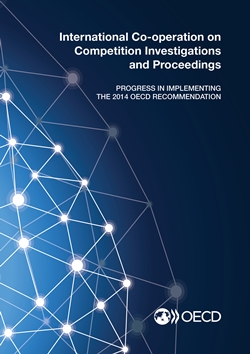Concurrence
International co-operation in competition
International co-operation is key to increasing competition in a globalised world
Globalisation, the digital economy, the proliferation of competition authorities and the increasing willingness of competition authorities, both young and mature, to engage in cross border cases has increased the number and scope of cross-border competition issues. Co-operation between jurisdictions is needed to:
For 50 years, the OECD and its Competition Committee have taken a leading role in shaping the framework for international co-operation among competition agencies. Recommendations, best practices and policy roundtables have served not only as models and inspiration for national initiatives but also as drivers for promoting co-operation on a global scale. This work is also promoted through the OECD's Global Competition Relations, such as the Regional Competition Centres, Global Forum on Competition and other regional competition forums. Through these activities, along with its data collecting and analysing functions, the OECD can develop a better understanding of the current status of co-operation and promote the importance of co-operation to those competition authorities who are not yet deeply engaged in cross-border competition co-operation. The OECD and its Competition Committee offer competition officials from developed and emerging economies a unique platform to monitor the state of international co-operation and to develop new solutions to increase the effectiveness of international co-operation. This work benefits from the support of a professional Secretariat and from the Organisation’s whole-of-government approach, taking advantage of expertise in other OECD committees and experience in international co-operation.
OECD work on international co-operation
Since 2012, international co-operation has been one of the main areas of work of the OECD Competition Committee. The OECD work on international co-operation contributes to improving co-operation for the benefits of enforcers, businesses and consumers by:
Key outputsIn 2022, to implement findings of the 2022 report and the 2021 OECD/ICN report, the OECD launched the Competition Enforcement Co-operation Database (CEC) which provides easily accessible information on the ability and legal requirements for international co-operation in 60 jurisdictions. In 2022, a report on the implementation of the recommendation found that the Recommendation continues to be relevant, it has been widely disseminated and there are possible areas for further work. In 2021, the joint OECD and ICN report on international co-operation was published, which included the results of a 2019 survey of OECD and ICN members and outlined proposed areas for future work for both organisations. In the same year, the OECD updated the inventory of MOUs between competition agencies and the inventory of international agreements on competition. In 2016, an inventory of international co-operation MoUs (Memoranda of Understanding) between competition agencies was also published. Based on over 140 MoUs, the inventory lists examples of typical and atypical provisions that can be useful for the negotiation of MoUs. It is updated from time to time as new MoUs are provided to the OECD. In 2015, the OECD and its Competition Committee built an inventory of international co-operation agreements on competition. These agreements are commonly used by competition authorities to strengthen the scope and degree of their collaboration, deepen their relationships and formally express their commitment to work together. It focused on 15 comprehensive government-to-government co-operation agreements. The 2014 report “Challenges of International Co-operation in Competition Law Enforcement” was the first attempt to gather empirical evidence on the need for closer co-operation between competition enforcers. This report provided support to the negotiations of the OECD Recommendation on International Co-operation on Competition Investigations and Proceedings which was approved by the OECD Council on 16 September 2014. In 2013, the results of an OECD-ICN survey on international competition enforcement co-operation were published and suggested ideas for future work in the area. |
KEY MATERIAL
LATEST PUBLICATION
|
Documents connexes



